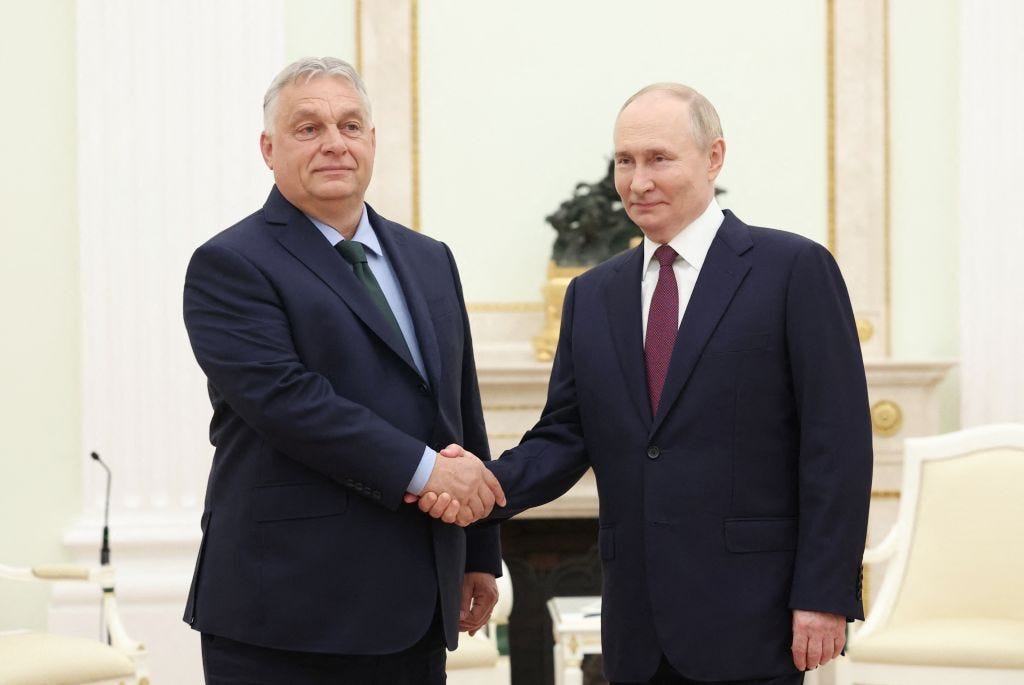Eating Their Own
NATO and the EU put the screws to two of its members.
“Nations whose nationalism is destroyed are subject to ruin.” – Muammar al-Gaddafi
A core friction at the heart of the European Union (EU) project is the extent to which power and authority are stripped from national governments and exercised at the supranational level in Brussels instead. The issue was hotly debated during the various national referendums to approve the EU’s foundational treaties, with supporters of the concept often downplaying concerns over eroding national sovereignty as reactionary or jingoistic. Much as the framers of the US Constitution would be aghast at the size and claimed authority of the current federal government in Washington, if the monstrosity of today’s Brussels had been known at the time, the citizens of many countries would have surely voted against joining the union. Alas, the size and scope of the bait-and-switch have been remarkable—once birthed, bureaucracies only know how to grow.
Our simplified model for understanding the current complexities of European politics involves a two-by-two matrix that partitions political leaders by their commitment to the EU project and their current hold on power at the national level. For example, Marine Le Pen is pro-France but out of power, whereas Olaf Scholz is strongly pro-EU and the current chancellor of Germany. The former is sidelined by an avalanche of negative coverage by the EU-friendly press, while the latter can best be thought of as a European citizen who happens to reside in Germany. The situation gets quite tricky when a politician prioritizes his or her national interests while also holding the levers of power. Here, the Brussels elite can only push so hard, as punishing an entire nation for the views of its leader risks provoking a patriotic backlash. One need look no further than the happenings in Hungary and Slovakia—member states of both NATO and the EU—for the destabilizing consequences of this particular quadrant.
In Slovakia, current Prime Minister and prominent Euroskeptic Robert Fico has long drawn the ire of Brussels, leading to a particularly toxic political environment in the country. In an unfortunate foreshadowing of what was to come in the US, an alleged lone gunman fired five rounds at Fico on May 15, landing two in the abdomen and one in the shoulder. It was the first such attempt on the life of a major European politician in two decades. Although critically wounded, Fico survived and remains as defiant as ever.
In neighboring Hungary, Prime Minister Viktor Orbán has parlayed his unique form of nationalism and his country’s influence within the EU to great effect, routinely extracting significant concessions in exchange for acquiescing to policies he undoubtedly finds questionable. Perhaps aghast at the developments in Slovakia and the devastation of the war in Ukraine, Orbán has personally embarked on a peace mission, crisscrossing the world to meet with Russia’s Vladimir Putin, China’s Xi Jinping, Ukraine’s Volodymyr Zelenskyy, and former US President Donald Trump. The pro-war crowd in Brussels is outraged by these activities:
“European Council President Charles Michel has reprimanded Viktor Orbán over the Hungarian leader’s self-declared ‘peace missions’ to Kyiv, Moscow, Beijing and Washington.
In a letter to Orbán seen by POLITICO, Michel says the ‘rotating Presidency of the Council [in Hungary’s hands since July 1] has no role in representing the Union on the international stage and received no European Council mandate to engage on behalf of the Union.’”
Setting aside the fact that one of the main arguments used against the concept of nationalism is that such “reptilian thinking” often leads to armed conflict between nations, the panic induced in Brussels by Orbán’s efforts to broker peace has a certain Orwellian hypocrisy to it. To the families of those dying in the Russian-Ukrainian conflict, the never-ending calls for escalation must seem incomprehensible in light of Orbán’s pursuit.
Orbán’s peace gambit has not been without risk—an odd thing to say about conduct that, in prior times, might have won a diplomat the Nobel Peace Prize. The EU and NATO have myriad ways to punish soldiers who step out of formation, and Brussels has taken extraordinary steps against Orbán and the people of Hungary, as well as Fico’s Slovakia. What happens in the coming weeks could very well cause both countries to decouple from the EU and NATO. Let’s explore why.



